November 9, 2025 – Day 3 of Youth Festival, Jo In-sung’s Real Talk, Closing Ceremony
Hello. Today marks the final day of the three-day Youth Festival journey.
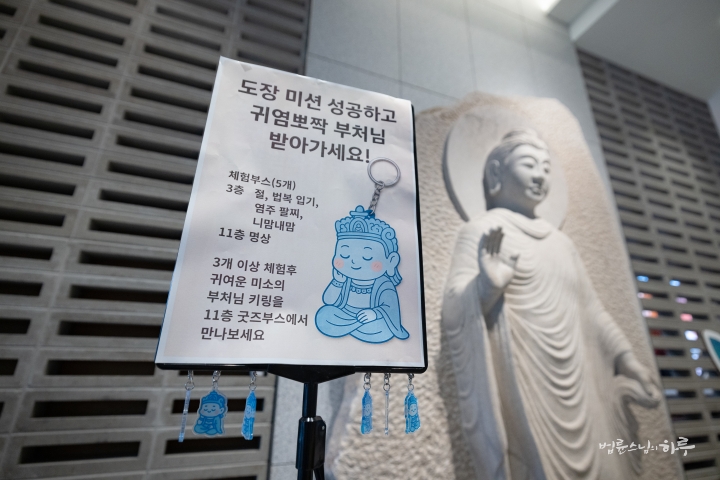
After completing his morning practice and meditation, Sunim headed to the Jungto Social and Cultural Center to attend the Youth Festival event. At the center, many young people had been lining up for two hours before the event started, hoping to get in early. Today was particularly popular as the famous actor Jo In-sung was scheduled to give a lecture, drawing an especially large number of youth registrations.
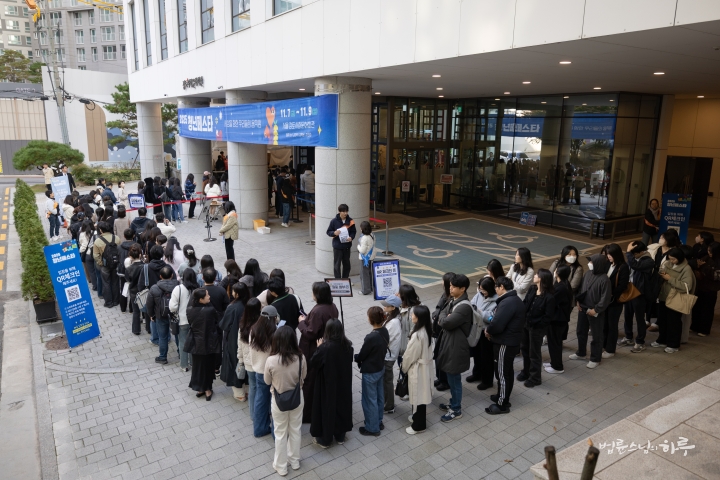
At 10 AM, actor Jo In-sung arrived. Sunim warmly greeted Jo In-sung.
“Let’s tour the entire venue together. This is my first time seeing everything too.”
Together with Jo In-sung, they toured all the booths of the Youth Festival from the 15th floor to the 3rd basement floor of the Jungto Social and Cultural Center.
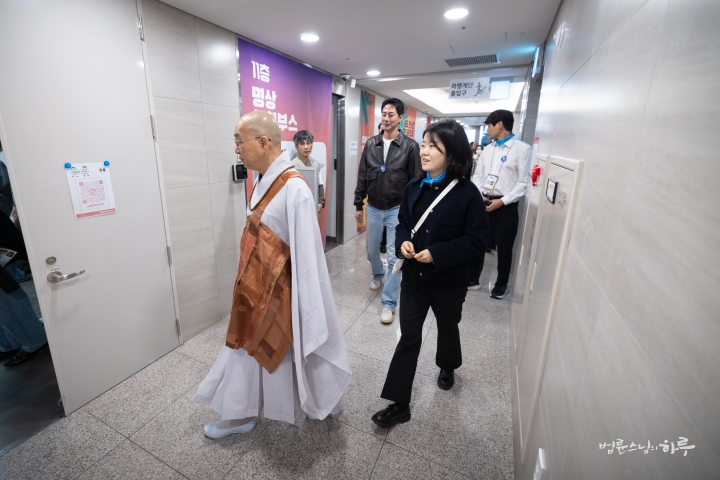
On the 11th floor was the meditation experience, on the 10th floor were special peace-building lectures, on the 9th floor were social seminars and NGO activist talks, on the 7th floor were the Heart Letter Station, Sewing Playground, Recycling Market, and Happiness School experience, along with various other activity booths. After encouraging the supporter volunteers running the booths, Sunim paused briefly at the Recycling Market.
“I could wear this gray coat.”
Jo In-sung, who was following behind, laughed heartily.
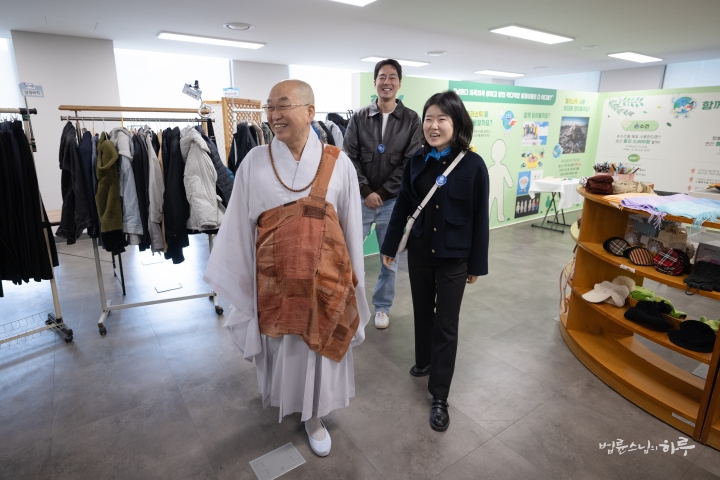
As they continued down the stairs, the 6th floor featured eco-cinema screenings, the 5th floor had heart-to-heart tea sessions, the 4th floor had escape room games, the 3rd floor offered practice experiences like prostration practice, trying on Buddhist robes, and making prayer beads, the 2nd floor had face painting, the 1st basement floor had vegetarian food booths with bite-by-bite meditation, and the 3rd basement floor hosted the JTS photo exhibition.
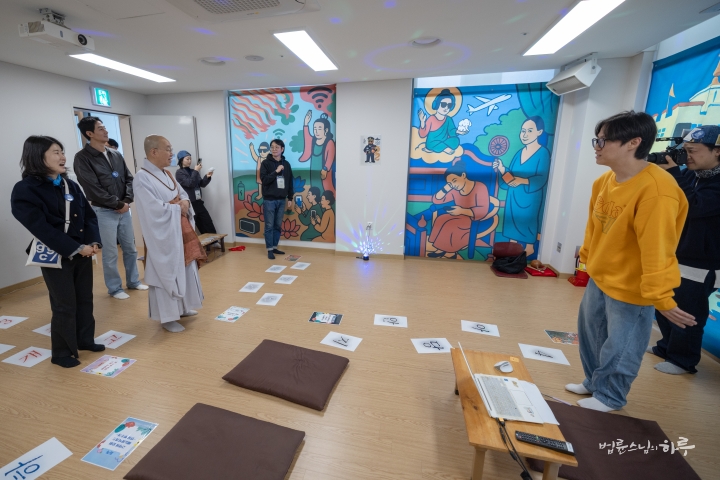
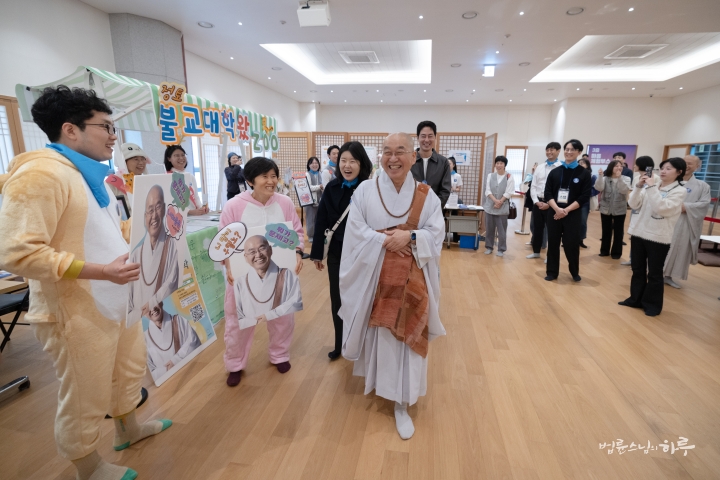
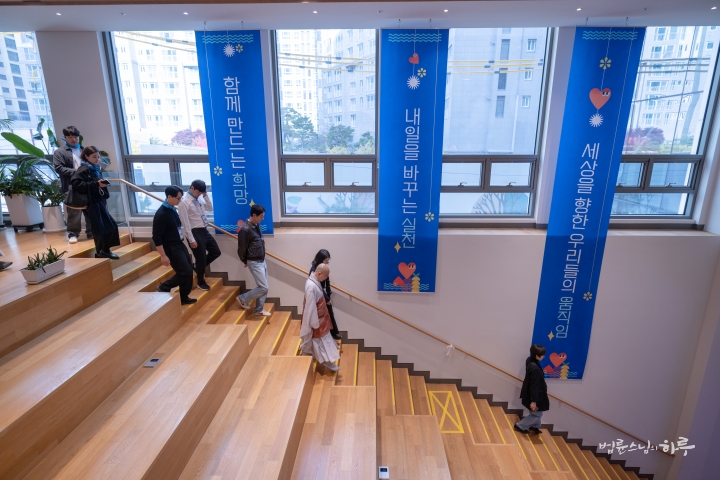
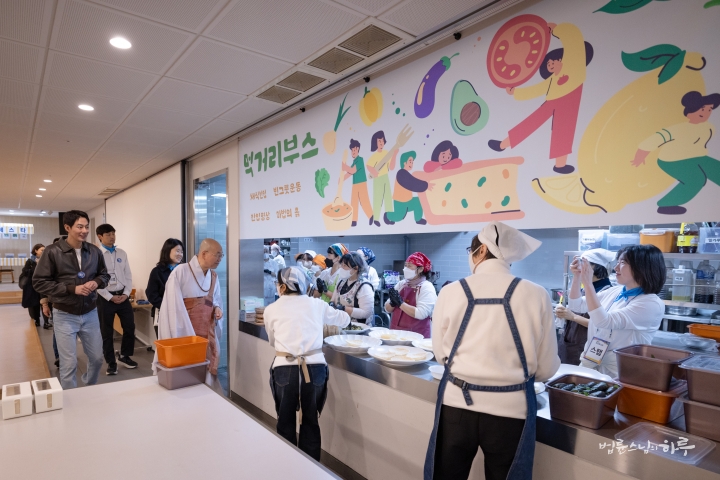
The JTS photo exhibition also displayed photos of actor Jo In-sung delivering coal briquettes as volunteer work and visiting Rohingya refugee camps. After touring the entire venue, Jo In-sung remarked:
“Oh my, the supporters must have worked so hard preparing all this.”
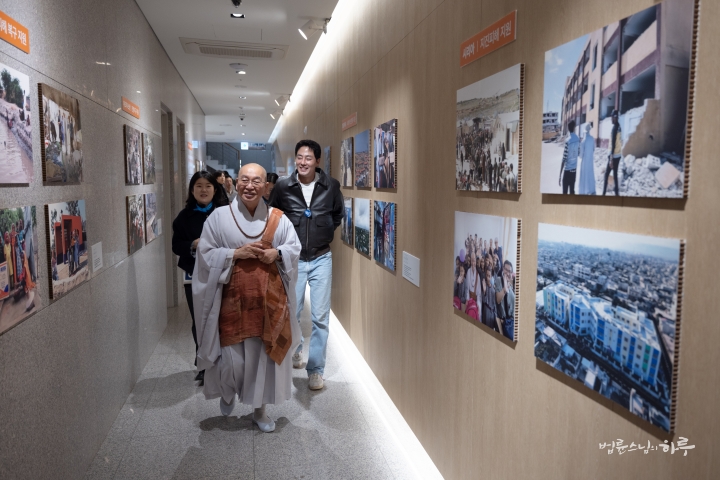
At 10:30 AM, Sunim entered the underground auditorium with Jo In-sung. As Jo In-sung appeared, the 500 young people filling the auditorium erupted in loud cheers and applause.
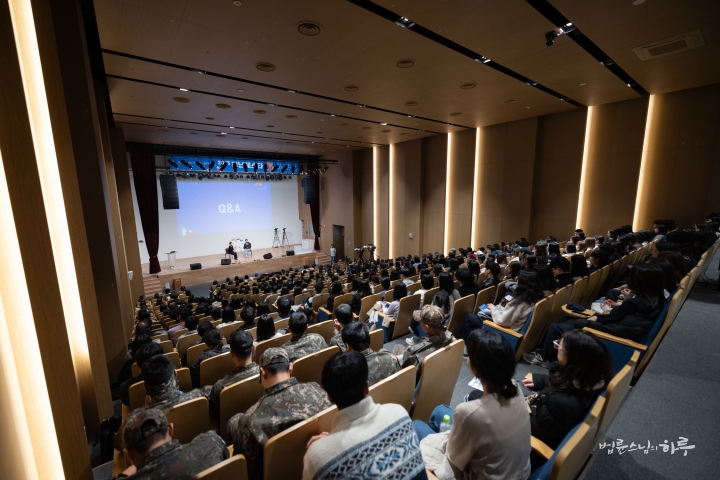
Taking the stage, Jo In-sung began the conversation with lighthearted jokes.
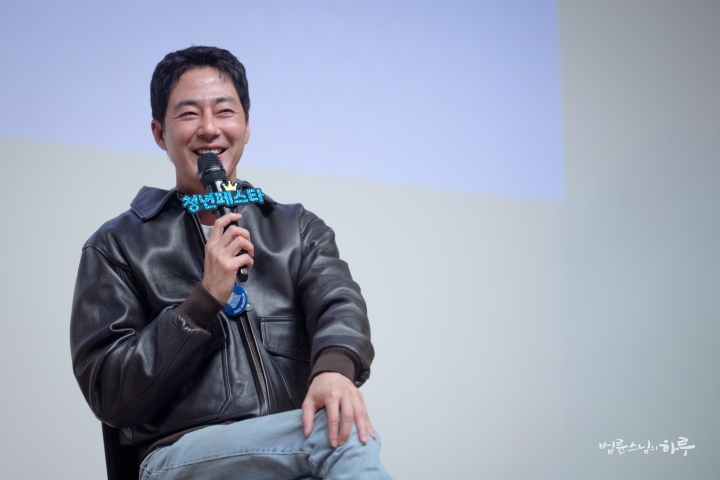
“So many of you came despite the early hour. Thank you. Did anyone come thinking that since Jo In-sung is here, Lee Kwang-soo, Do Kyung-soo, and Kim Woo-bin would follow? Those people can exit to the left now.” (Laughter)
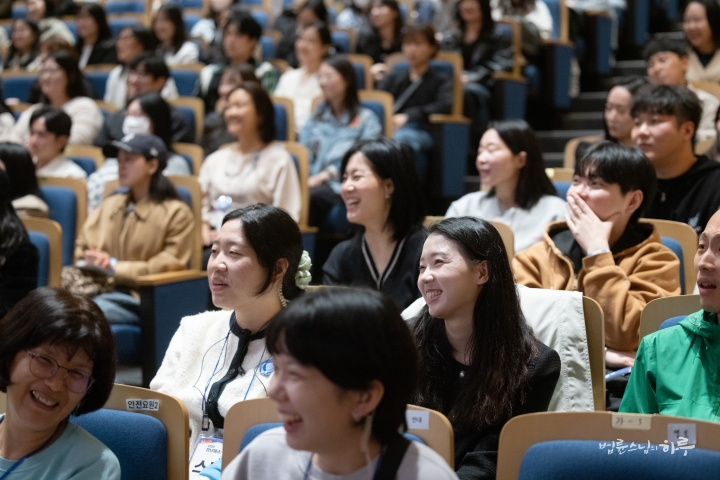
First, the host asked Jo In-sung about his youth, what led him to start practicing, the meaning of volunteer work, how he deals with public criticism, and balancing work with practice. Jo In-sung shared his journey of starting practice due to his own suffering, the anxiety and growth he experiences on intense acting sets, his attitude toward failure, maintaining an unshakeable mindset in relationships, and how volunteering warms his own heart, offering realistic yet warm comfort to the young audience.
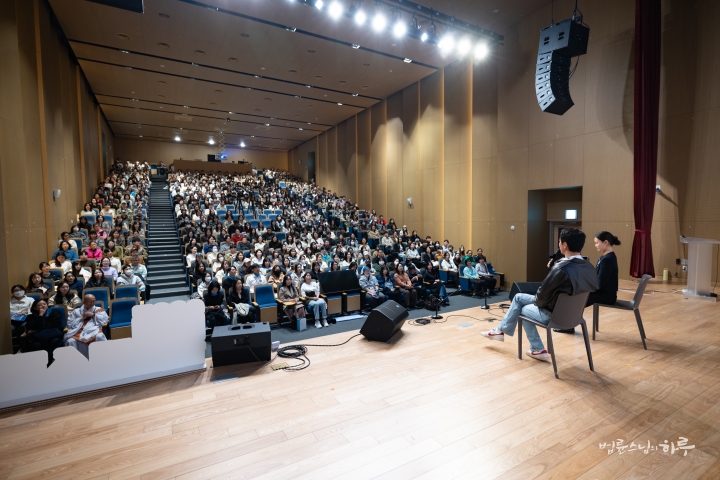
Next, they had a Q&A talk session where Jo In-sung picked and answered questions that young people had written on post-it notes beforehand.
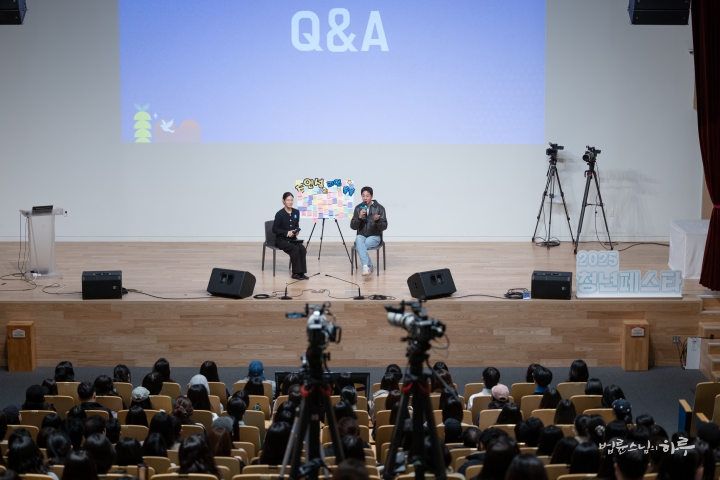
After answering some light and fun questions, they also took questions from the audience.
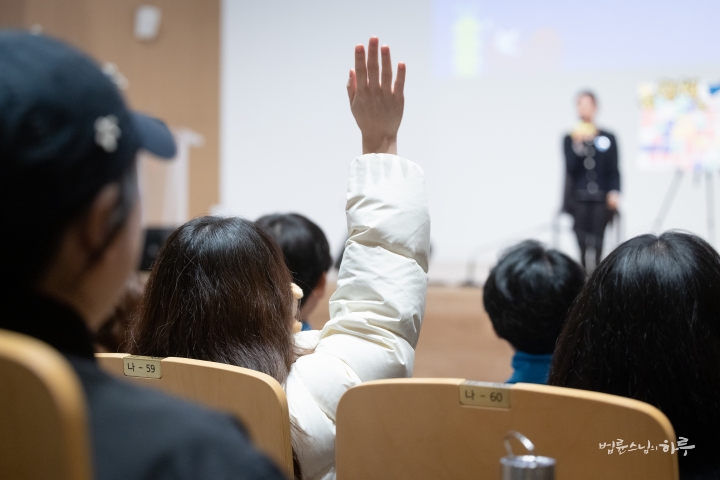
Young people shared their honest and vivid concerns – from an aspiring film director who feels fear every time he steps on set, to an office worker conflicted about whether to endure or confront workplace harassment and sexual harassment, to a soldier struggling with heartbreak. The young man in military uniform paused to catch his breath, then spoke with a tearful voice.
“Loyalty! I really enjoyed your lecture. I’m going through a breakup, and could you give me some specific solutions?”
Small sighs came from the audience, and Jo In-sung leaned forward and began speaking gently.
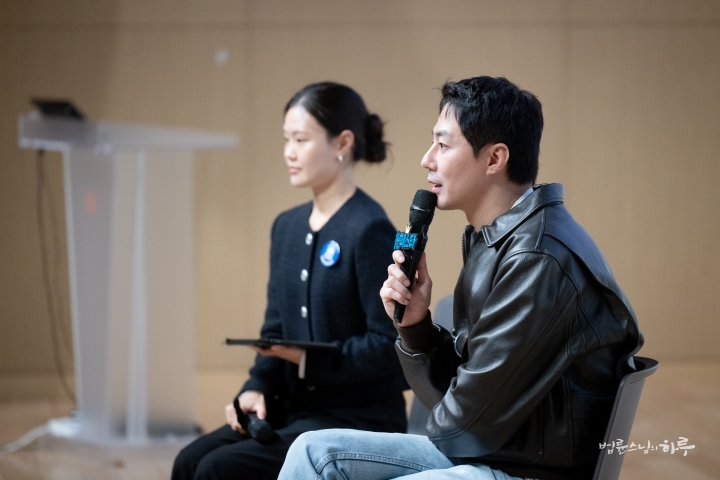
“Ah, I really want to give you a hug. How long were you together?”
“We dated for about 2 years.”
“Then you’ll probably need to grieve for about 4 years, double that time. It’s not good to forget too quickly either, right? Because that would mean your love was only worth that much. So I think it’s better not to try to forget too quickly. It’s bound to hurt. There’s no cure for breakups. But on the other hand, I want to say congratulations. I think you’ll meet a nice woman soon?” (Laughter)
“Ah, thank you.”
“It’s kind of exciting when you think about it that way. And now you’re a bit freer, aren’t you? There must be some good points too.”
“There are some good points.”
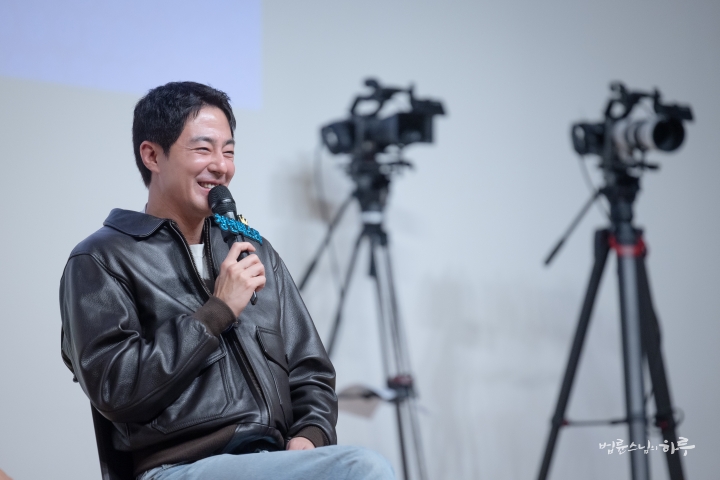
“That’s right. Actually, the idea that breakup equals sadness doesn’t hold true. Separation itself and sadness aren’t directly related. When you break up with someone you really disliked, you might feel relief or even joy instead. The reason you’re struggling now isn’t because of the ‘breakup’ but because you can’t let go of the attachment in your heart. So don’t view the breakup only negatively – try to find the good points in it too. There definitely are some. Congratulations on your newfound freedom.”
“Thank you.”
The soldier’s voice, which had been filled with tears, now carried a hint of laughter. The audience also applauded loudly to encourage the soldier.
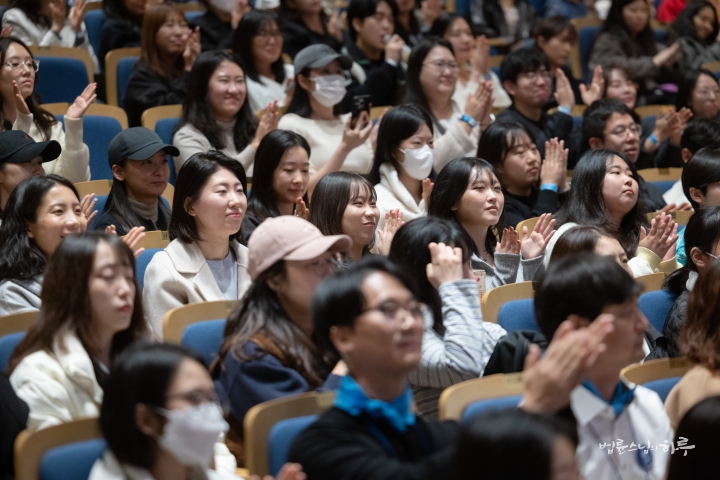
Sunim sat in the audience, listening attentively to the conversation between Jo In-sung and the young people.
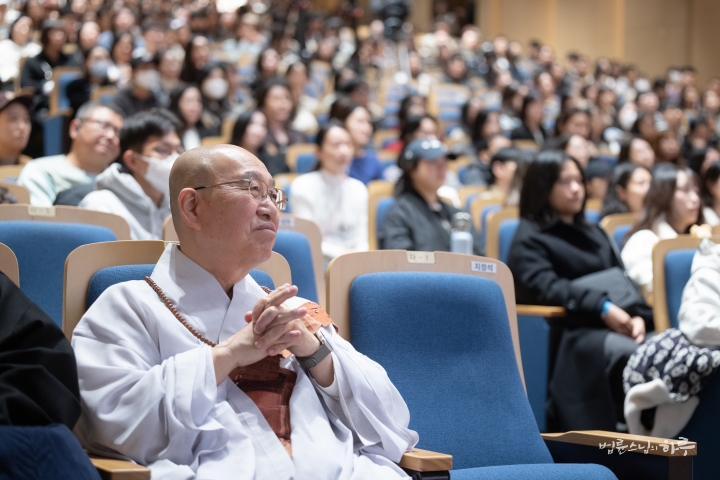
As the event was wrapping up, the host asked a final question: “Could you share one message for the young people here today?”
Jo In-sung smiled briefly, then picked up the microphone.
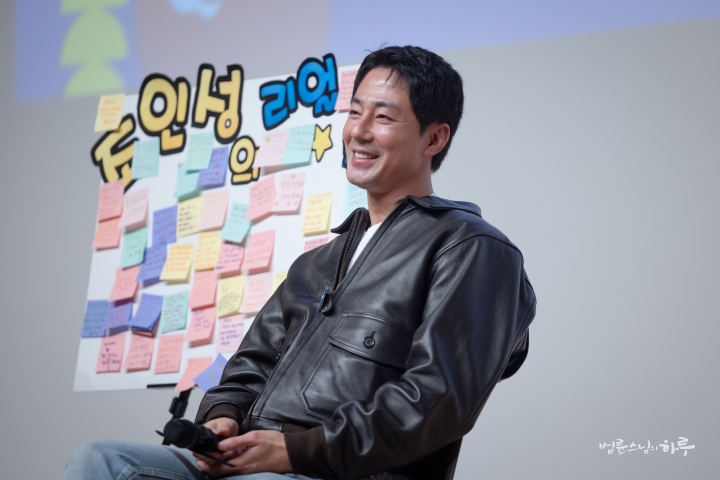
When Things Are Hard, Stop Comparing and Just Say This
“These days, I often say ‘You can do it!’ When something is difficult, I find myself saying ‘Ah, I can’t do this.’ But whenever that happens, I just tell myself ‘You can do it.’ Try it when you’re struggling and things aren’t going well. If you can’t avoid it, ‘You can do it’ might be better. When I hit a wall at work, I say ‘Yes, I can do it. Let’s try.’ If it doesn’t work out, I just lightly say ‘It didn’t work’ and move on. I tell my juniors the same thing: ‘I tried it and it didn’t work. Sometimes things don’t work out.’ I think we need to know how to let things pass lightly instead of taking everything too seriously.”
When Jo In-sung finished speaking, the host raised the energy even more. “Then when In-sung says ‘You can do it!’, shall we all shout it together?”
The host counted “One, two, three!” and Jo In-sung said powerfully: “You can do it!”
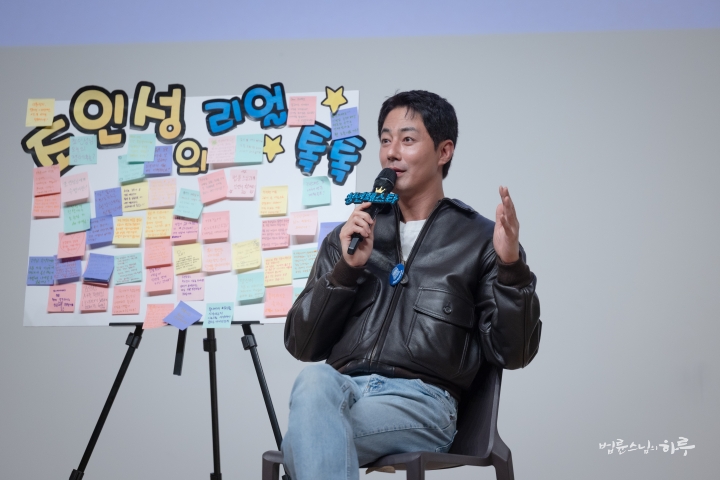
The young people’s voices rang out in unison: “You can do it!”
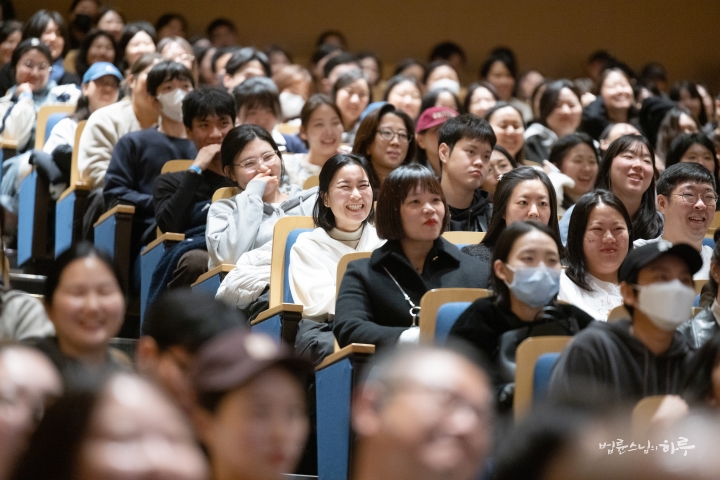
Though it was a short cheer, a bright energy spread throughout the auditorium. After conversing for an hour and a half, Sunim and Jo In-sung took a commemorative photo with the young people.
“Our movement toward the world!”
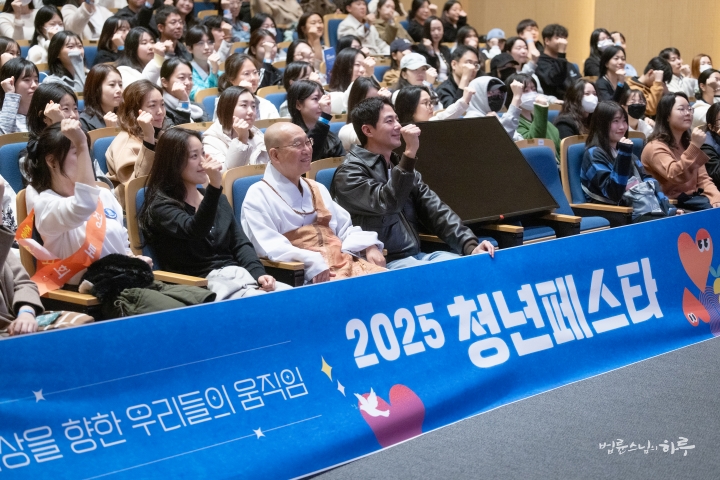
Sunim had lunch with Jo In-sung at the food booth on the first basement floor. Vegetarian tortillas, kimbap, and rice balls were served on rice cracker plates.
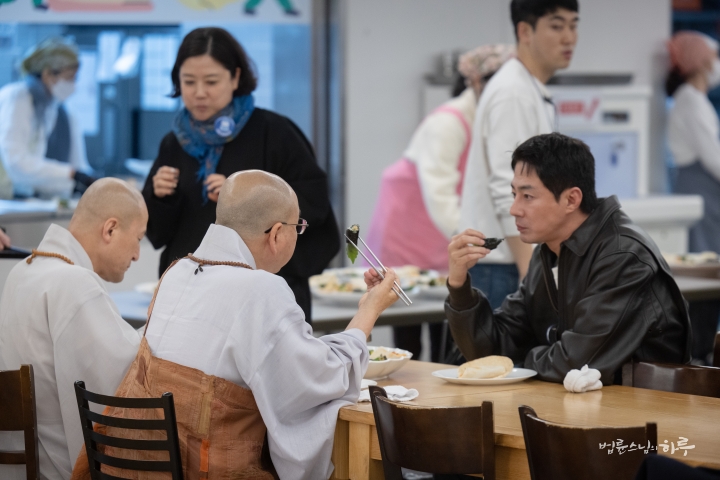
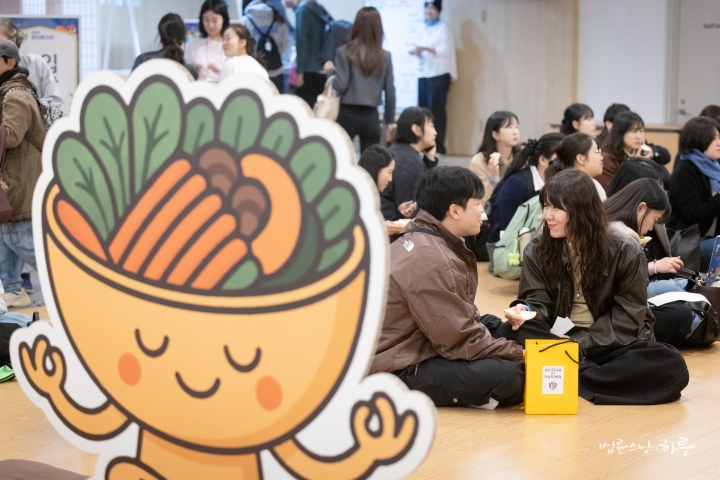
After expressing gratitude to Jo In-sung for making time for the young people despite his busy filming schedule, Sunim headed to The Peace Foundation. After handling some work at The Peace Foundation, at 2 PM Sunim headed to the underground auditorium to give the final lecture of the Youth Festival.
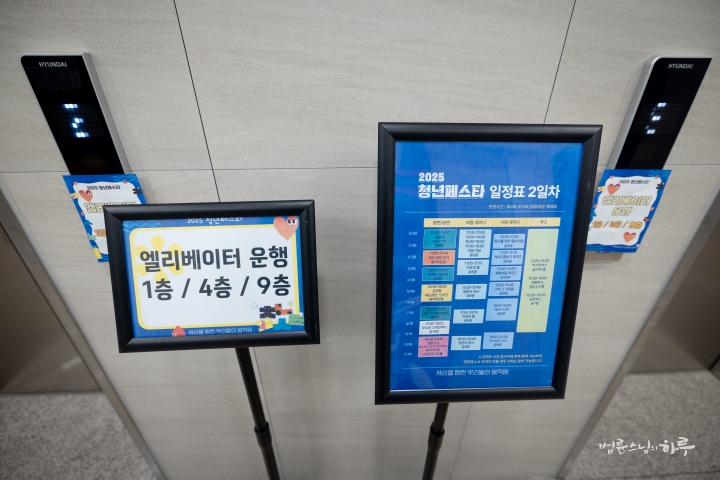
The theme of the Youth Festival’s final lecture was “The Attitude of Youth Facing a New Future.” With about 500 young people in attendance, the lecture began with an opening performance prepared by the Jungto Society Special Youth Division.
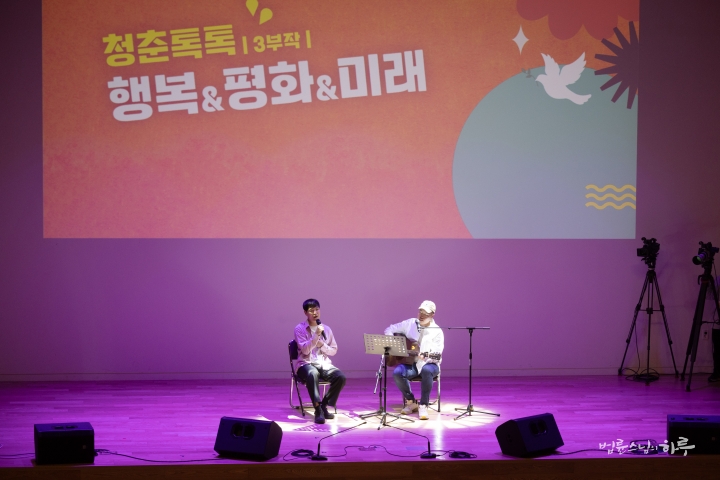
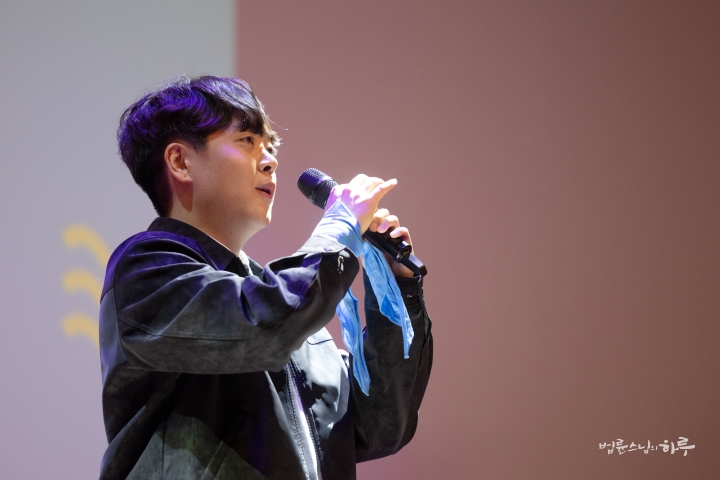
After watching a video about the life of a young person living in 2025, Sunim came up on stage to great applause. First, Sunim gave his greeting.
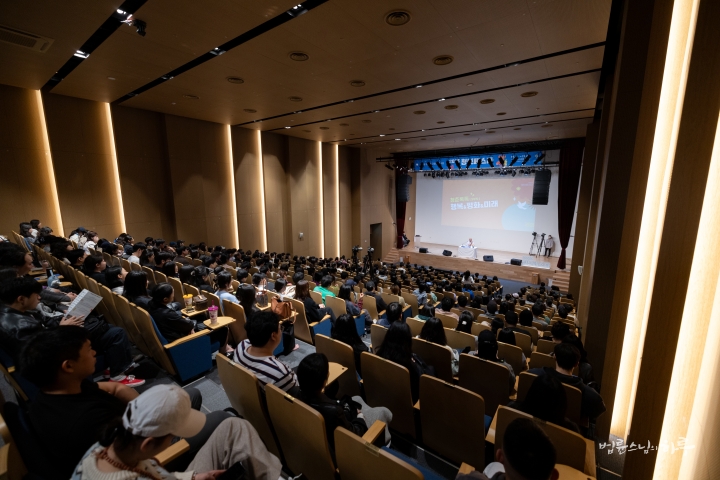
“Did you visit all the booths during these three days?”
“Yes!”
“Since this is the last program, I’ll try to keep my answers as short as possible so I can talk with as many of you as possible. Let’s start taking questions right away.”
He immediately began taking questions. The first questioner was concerned that jobs would decrease and polarization would worsen in the AI era, and asked Sunim for advice on how to prepare for such a future.
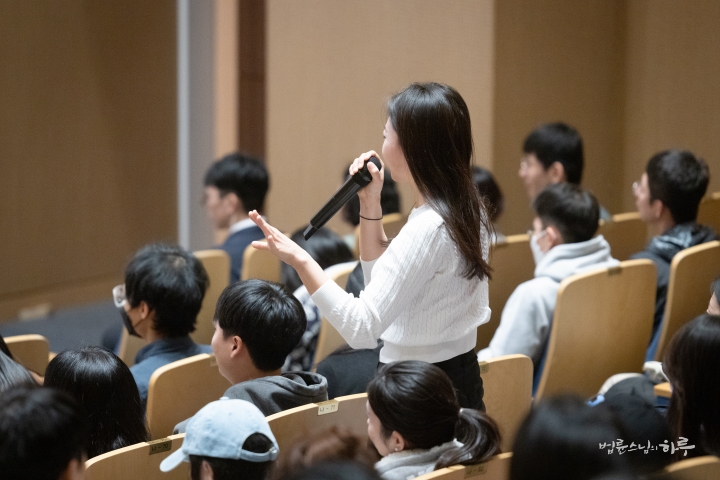
What Should We Prepare for If AI Makes Jobs Disappear?
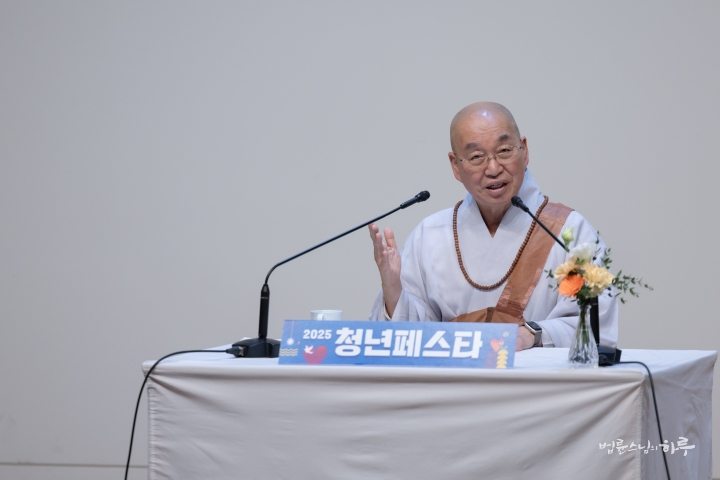
“That’s possible, but not necessarily true. Looking at history, while many existing jobs disappeared as science and technology advanced, new occupations were created at the same time, so people didn’t lose their jobs. Think about Korean society in the agricultural era a hundred years ago – about 90 percent of the population farmed. Some engaged in commerce, some worked in technical jobs like blacksmithing. The rest were government officials. But now, less than 10 percent of the population farms. Yet the rest haven’t all lost their jobs. That’s because new professions that were unimaginable before have emerged. A hundred years ago, who could have imagined that trimming nails, cutting hair, or doing makeup would become professions? All these jobs are newly created.
In the AI era, many current jobs will decrease. The number of doctors, lawyers, and technical workers will decline, and self-employed businesses may decrease like they are now. But at the same time, new jobs will emerge. In other words, rather than jobs disappearing, the form of jobs will change. However, this becomes a problem for people with existing jobs because those jobs will disappear. For example, what if someone who has been farming for 30 years suddenly can’t farm anymore and has to do welding in a factory? It’s not easy because they have to learn new skills, and their competitiveness drops. On the other hand, if a 20-year-old young person starts farming anew, I have a huge advantage over them thanks to my long experience. But if I, who have only farmed, go to the city and learn welding, then both the young person and I are starting from the same starting line. In fact, I’m at a disadvantage. I have a family to support, after all. For people like this, change comes as a huge burden.
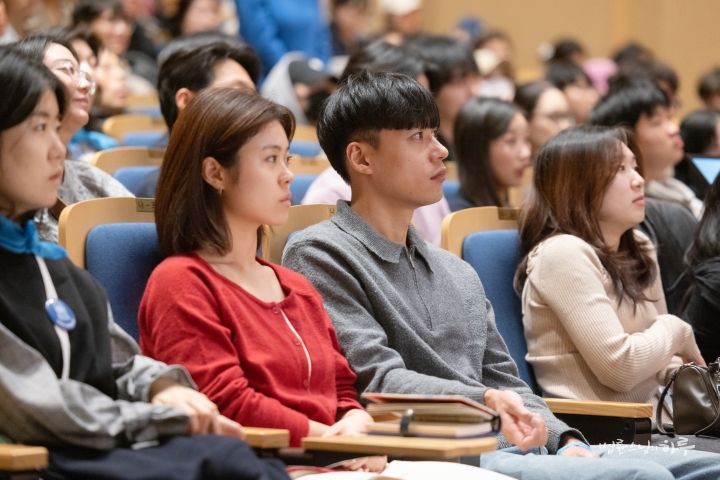
In fact, during the industrialization process, these people fell into urban poverty. A similar phenomenon could occur in the AI era. When jobs that people have specialized in and worked at for a long time disappear, they need to transition to new jobs, but they get pushed out in the competition. If they can’t make the transition, they ultimately lose their jobs. To solve this social problem, ‘re-education’ is necessary. It means helping people transition to new jobs. For those who still cannot find employment despite these efforts, the ‘social security system’ must guarantee a minimum livelihood. This means that the state must operate a social security system to ensure people can maintain a dignified life. A representative example of such a social security system is the ‘basic income system’ proposed in Switzerland in 2016. The proposal was to pay every Swiss citizen 3 million won per month regardless of employment status. However, it was rejected in a national referendum.
Basic income is literally a system that provides the minimum amount necessary for survival. If people want to live more affluently beyond that amount, they need to have their own jobs. Some people protest, asking ‘Why should we support people who don’t work?’ but these people aren’t unemployed because they want to play around. As times change, existing jobs are disappearing. Conversely, those who ride the wave of change well and seize new opportunities earn much higher incomes. Part of those profits is collected as taxes and distributed as basic income to those who have lost their jobs or become low-income earners. Without such a system, many people risk falling into poverty, or even absolute poverty.
The newly born generation doesn’t need to worry much. Children are familiar with the new era and new job environment from the beginning. I was born in an era without electronic calculators and learned the abacus and mental arithmetic in elementary school. We did all calculations by hand. But the next generation uses electronic calculators. Similarly, while until now we had to learn and master knowledge and skills, in the AI era, there’s no need to do so. Just as we tap on a calculator, we’ve entered an era where we can find and use the knowledge and skills we need. Now, instead of memorizing information in our heads, we can access externally stored information anytime. Rather than spending a lot of time acquiring knowledge or skills, we only need to develop the ability to find and utilize necessary information.
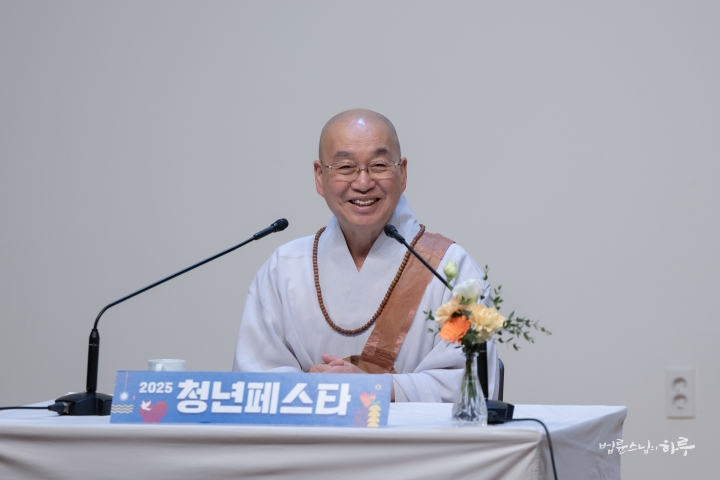
In the past, if you wanted to drive a car, you also had to know how to repair it. But now, you only need to know how to drive, even if you can’t fix it. If it breaks down, you can just take it to a repair shop. Just like that, as times change, the way we operate changes too. Currently, when taking exams, we write answers from memory, but in the future, people will take exams with laptops or tablets. It won’t be about testing what you remember, but rather evaluating how well you can solve problems. Education will shift toward developing the ability to search for necessary information, combine it, and solve problems.
That’s why the new generation doesn’t need to worry. Even if the climate changes, the generation that grows up in that change will naturally adapt. For example, if our generation had to live in a hot place like Bangkok or a cold place like Siberia, it would be very difficult. But children born and raised there are already accustomed to that environment. Similarly, children born in the future will grow up in the changed environment, so they won’t feel much difficulty. On the other hand, our generation will inevitably struggle. Summers may get hotter, winters colder, typhoons stronger, and droughts longer. We feel the change because we have memories of the past, thinking ‘This year’s typhoon is stronger.’ But the new generation accepts that climate as normal. It’s like how someone from Korea would find the lack of water in the desert inconvenient, but children born in the desert naturally accept that environment. To them, the desert isn’t a bad place—it’s their hometown and a familiar world.
I once did relief work in Afghanistan for three years. One day, a young man told me, ‘Afghanistan is the most beautiful country in the world.’ To me, it looked like a half-desert, so it was hard to agree with him. But that young man had never been outside Afghanistan. However, when I visited again the following spring, I was truly amazed. The snow that had accumulated during winter had melted, and flowers bloomed across the fields and mountains, completely transforming the desert-like land. It was a spectacular sight, like a carpet laid over the sand, more beautiful than I could have imagined. Only then did I understand why that young man called his country the most beautiful in the world.
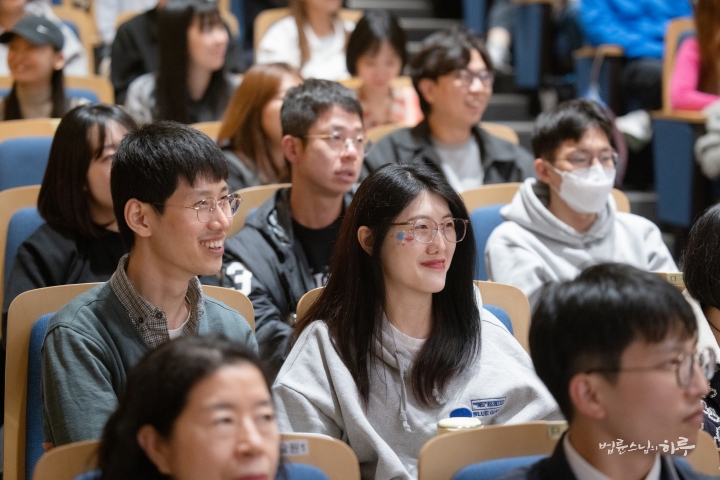
When the Industrial Revolution first began, many manual laborers lost their jobs to machines, leading to the Luddite Movement where workers destroyed machinery. This shows how threatened they felt about losing their livelihoods. Many people actually did lose their jobs and suffered greatly. However, just as new jobs emerged with those changes, the loss of existing jobs during transitional periods is inevitable.
For example, Amazon is reportedly laying off 30,000 employees. We don’t know how many more will be laid off in the future. This phenomenon will appear all over the world. These people have lost their jobs, but new opportunities won’t appear immediately. That’s why we need social safety nets to guarantee their livelihood for a certain period and provide retraining to help them transition to new jobs. The younger generation needs to be educated from the beginning to prepare for and adapt to new jobs in this changing environment.
Recently in Korea, the low birth rate is being discussed as a major social problem. But I’m not sure if the declining birth rate is really a problem. From today’s perspective, population decline seems problematic, but if jobs decrease even more than now, having a smaller population might actually be better. If a million college students graduate every year, how could we provide jobs for all of them? When survival conditions improve, birth rates naturally decline in ecosystems too. Animals at the top of the food chain have fewer offspring with longer intervals between births. Conversely, animals lower on the food chain have many offspring at once with shorter intervals. From that perspective, I think the declining birth rate might be a natural phenomenon.
If there are problems, we need to research how to solve them. And if necessary, we need to change the system. Agricultural societies and industrial societies have fundamentally different systems. Since you were born in an industrial society, you might think the system has always been this way, but are the systems of the Joseon Dynasty and modern society the same? The education system is the same way. They’re completely different. Just as current systems are completely different from the past, AI-based industrial and educational systems will look entirely different from what we have now.
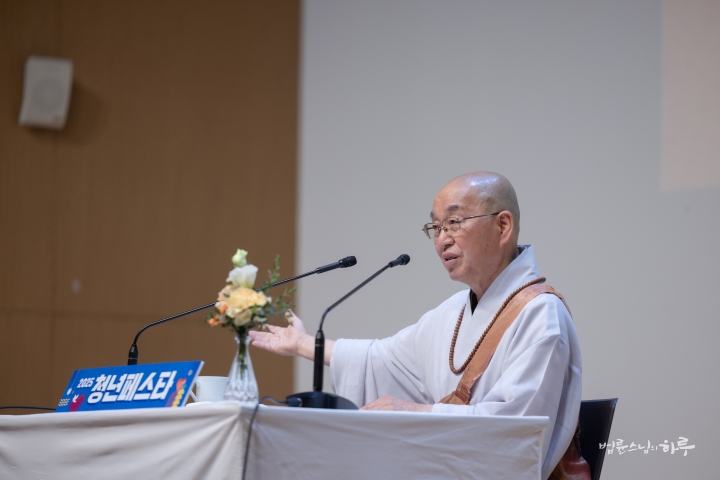
We can’t predict exactly how things will change, so this transition period creates confusion. Historically, the period from the 1800s to the early 1900s was the most difficult time for people. They experienced tremendous hardships. We need to accept some degree of difficulty during transitional periods. For example, in the past, people made a living catching squid and pollock in the warm waters of the East Sea. But as the water temperature rose, the fish species changed. Since the existing boats were designed for catching squid or pollock, they couldn’t suddenly switch to anchovy fishing boats. They needed new boats, had to change fishing techniques, and had to adjust processing plants. It takes time, but it’s not like the fish have disappeared from the East Sea. During this transition period when fish migrate from one area to another, people who lived by traditional methods face difficulties adapting to the new environment. It’s similar to the hardship of adapting to language and culture when moving from Korea to the United States. So there’s no need to worry too much.
What’s important is how quickly we can reflect these changes. We need to change social and educational systems, adjust to new occupations, and build social safety nets to provide social security so people can maintain a minimum standard of living. There’s no need to worry. However, if we don’t respond properly, many people will suffer. Why is the wealth gap widening so rapidly now? It’s because the tax system – the way we collect taxes and spend finances – is still the old system. Society has changed and the way income is generated has completely changed, but the system remains the same, causing the gap to widen rapidly. I saw in the news recently that they’re paying Elon Musk a special bonus of 1 trillion dollars. That’s about 1,400 trillion won in our currency, more than half of Korea’s annual GDP. Korea’s 2024 GDP is 1.8 trillion dollars. Instead of paying this money like this, shouldn’t we recognize that person’s contributions but use part of that money to guarantee the lives of people who suffer losses during the transition period? But such a system isn’t in place now. Because it’s paid according to the old method, people are starving on one side while ultra-high earners emerge on the other.”
“After listening to Sunim’s words, it seems unavoidable. There’s a saying, ‘If you can’t avoid it, enjoy it,’ but it doesn’t seem easy to enjoy. I’ll continue to think about solutions.”
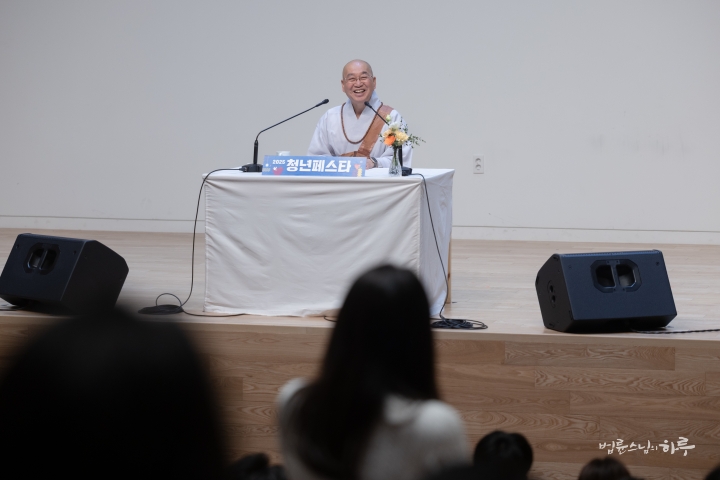
“We need to respond together to find new methods suitable for the changed era. In Daegu, they’ve been growing a lot of apples, but apple yields are decreasing due to rising temperatures. Then we need to research whether to plant persimmons or pears and conduct various experiments. But if someone who has only grown apples their whole life thinks, ‘If I can’t grow apples, I can’t do anything,’ they’ll end up abandoning farming. To survive, they have no choice but to switch to persimmon or pear farming through retraining, or if they’re older, stop farming and live on basic income.”
“Thank you. I understand well.”
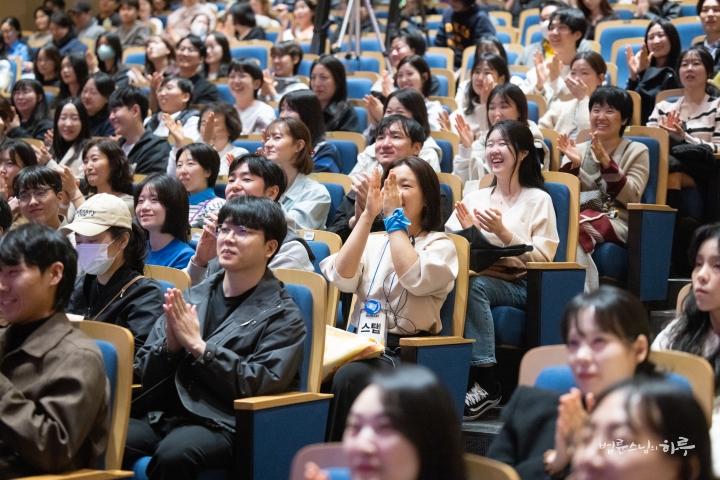
Questions continued to follow.
In an era where AI replaces 80% of work, the meaning of my job is becoming increasingly vague. Where should I find personal value and growth in this environment?
I work in sustainability but am considering returning to farming for a more sustainable life. Is there a realistic path to maintain a livelihood in the countryside while also helping the local community?
I need to move to Jeju if I get married, but people around me say there’s no future vision there, which is shaking my resolve. What values should I use as criteria to decide on marriage and life direction in this situation?
It’s not easy to balance dating and marriage amid AI-era anxiety, leading to frequent conflicts. What should I prioritize in my life going forward?
I have almost no desire to have children and wonder if my thinking is a natural phenomenon or some kind of deficiency. How should I view childbirth and personal growth in this era?
After a relationship ended due to distance, my romantic feelings disappeared, work became boring, and my life motivation decreased. How should I set my life direction in this situation?

Young people shared their deep concerns with Sunim about AI-era anxiety and the meaning of future careers, major life choices like marriage, childbirth, and relocation, and how to establish life direction and values amid relationship breakdowns and lethargy.
As the dialogue concluded, Sunim gave closing remarks.
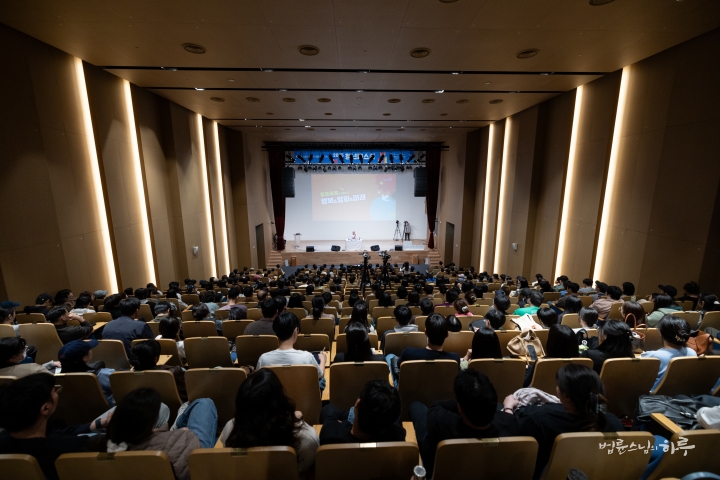
“How was attending the Youth Festa? Should we continue next year, or would it be better not to?”
“I hope it continues!”
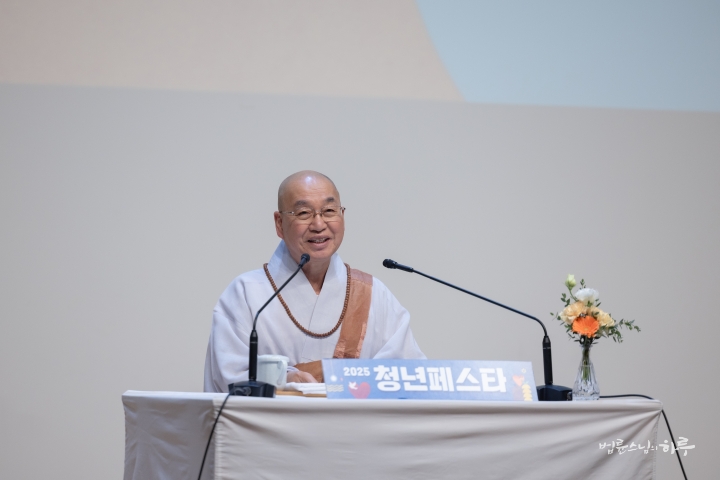
“The goal of this Youth Festa was to encourage young people. These days, young people seem a bit discouraged, so comfort and encouragement were needed first. But comfort and encouragement alone aren’t enough. Awakening is needed. That’s why I took on the role of saying ‘Let’s get our act together.’ If we join forces, we can live with hope. In the morning ‘Real Talk Talk’ session, I saw young people shouting ‘We can do it!’ with Jo In-sung. That’s exactly how we should create hope together.
The Power of Youth Festa Created by Young People with ‘100% Volunteer Work’
This event was created 100 percent by volunteers for all programs including performances, lectures, seminars, and booths. I think this is the biggest feature of this event. I wanted to show young people that we can do it even starting from scratch with nothing, so we gave it a try. I’m glad you all thought the programs were good too. Encouraged by this, we’ll try to make it an even better event next time. Thank you.”
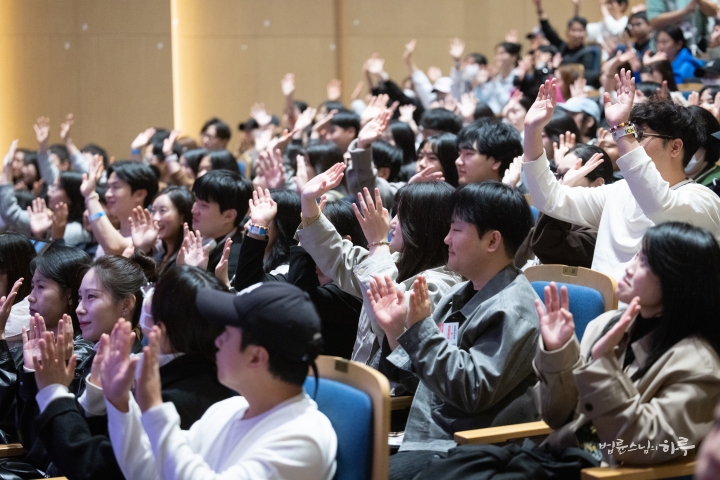
After all the attending young people left the lecture hall, at 4 PM, only the supporters who prepared the Youth Festa gathered for a closing ceremony to wrap up the three-day Youth Festa event.
This Youth Festa was prepared over the past three months with the participation of about 700 youth supporters. First, they watched a video together showing the Youth Festa preparation process and the three days of events.
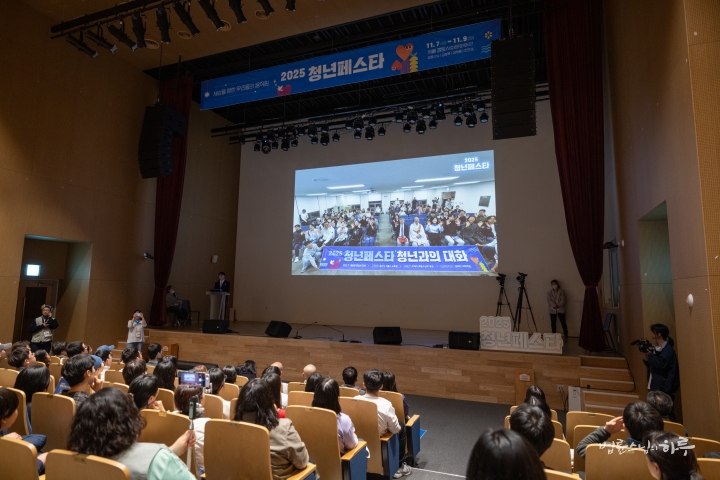
They could reflect on how this Youth Festa was not just an enjoyable festival or one-time event, but a place where young people realized they are the masters of the world and agents of change.
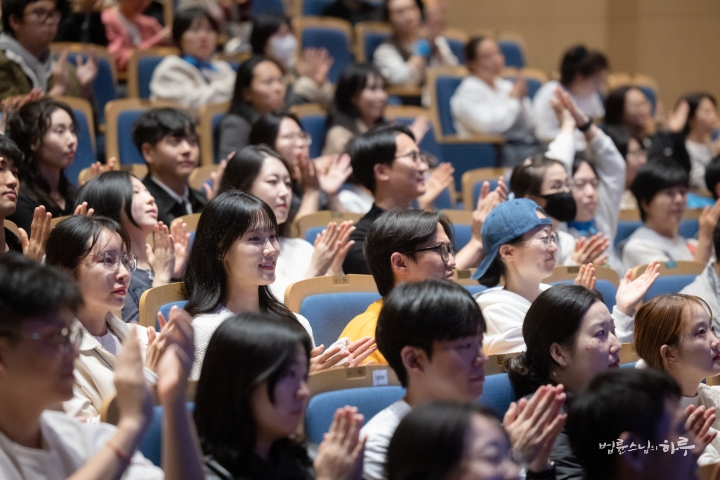
After taking in the afterglow of the event, the youth supporters asked Sunim for closing remarks. Taking the stage, Sunim explained the reasons for holding the Youth Festa and then expressed encouragement and gratitude to the young people who worked hard to prepare the event.
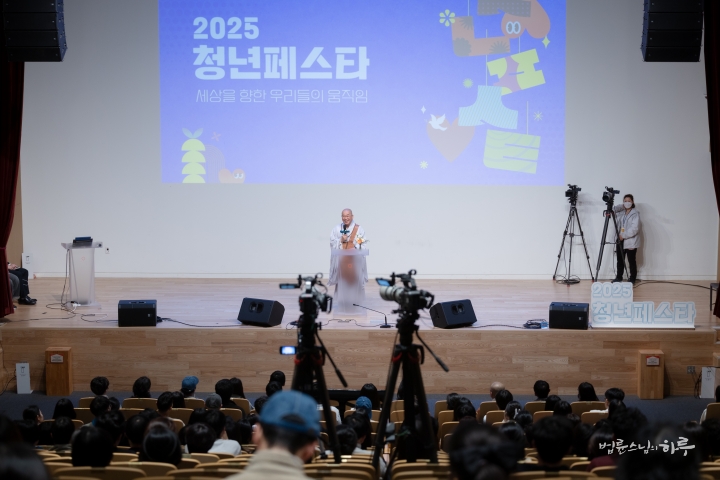
“You all worked really hard for three days. Was it difficult but rewarding?”
“Yes!”
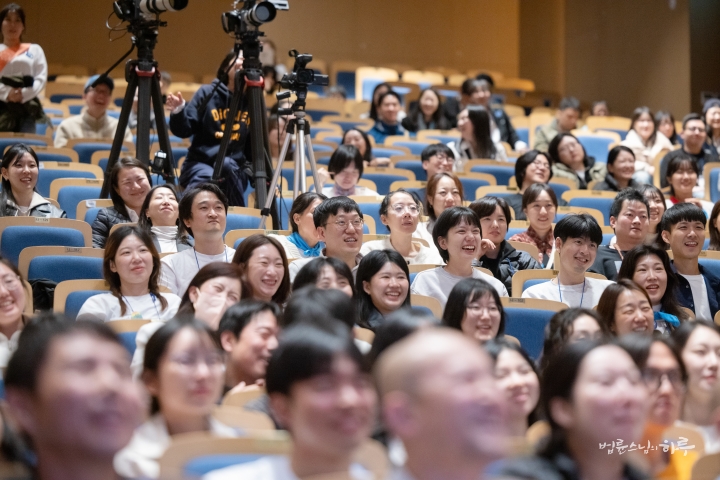
“That’s good. Everyone says life is hard, but when work is rewarding, even if it’s difficult, joy remains after it’s over. On the other hand, when something is enjoyable but not rewarding, regret remains afterward thinking ‘I wasted my time.’ In other words, pleasure is momentary but the suffering of regret is long, difficulty is momentary but the joy of fulfillment lasts long. So I think enduring short-term difficulty to gain long-term joy is a much more efficient way to live life.
Korea’s status has risen significantly worldwide. With growing cultural influence through K-pop, K-drama, K-beauty, etc., young people overseas who used to dream only of America now dream of ‘wanting to visit Korea’ and ‘wanting to live in Korea.’ What I’ve felt traveling around the world is that I now hear Korean greetings like ‘Annyeonghaseyo’ and ‘Gamsahamnida’ in many countries. This is probably the first time since Dangun that Korea has become so well-known globally.
But our young people living in this land are falling into despair and unable to have hope. More young people are shutting themselves in their rooms playing games, and even those with jobs remain satisfied with personal fulfillment with little interest in society, the nation, or the world. That’s why they’re sometimes evaluated as selfish. Statistics also show high suicide rates and low birth rates. I’m a bit concerned about whether hopeful central talents who will lead our country in the future can be cultivated. With this awareness of the problem, we planned this Youth Festa with the intention of ‘injecting a spirit of hope into young people.’
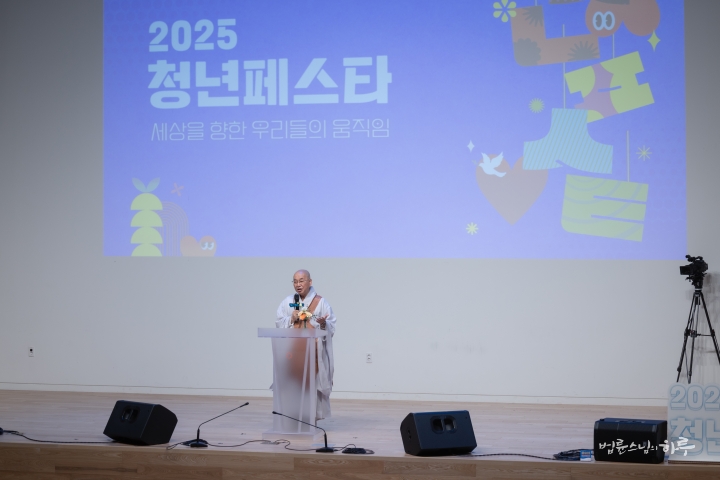
Some might ask, ‘What problems do young people have?’ While they may seem fine for now, the reality is that they lack hope for the future. In the past, many young people worried about breaking up with their partners, but nowadays it’s common to find young people who haven’t even dated once by the time they’re thirty. Beyond issues of marriage or raising children, hope for marriage itself is disappearing. While previous generations had hope that ‘if you work hard, you can live well,’ today’s young generation finds marriage, homeownership, and stable employment all difficult to achieve. This is why we cannot understand these issues by judging them based on past standards, saying things like ‘What’s the problem? How hard was it in our time?’
That’s why, first, young people need comfort and encouragement. Programs are needed where their pain and sense of helplessness can be shared and understood. Second, comfort alone is not enough. Only by going out into the world and facing challenges directly can they realize how precious what they have is. Rather than just complaining, they need time for self-reflection and awakening. This is precisely the role I excel at – the role of poking with an awl, so to speak. (Laughter) People cannot live on comfort alone. There must be awakening, along with some fun and benefit. So I wanted to create a space where those who stayed only in their rooms could come out and see the world, where those who knew only themselves could open their eyes to the world, and where those who were alone could hold their neighbors’ hands. I wanted to make this space open to all Korean youth, without limiting it to any religion or organization.
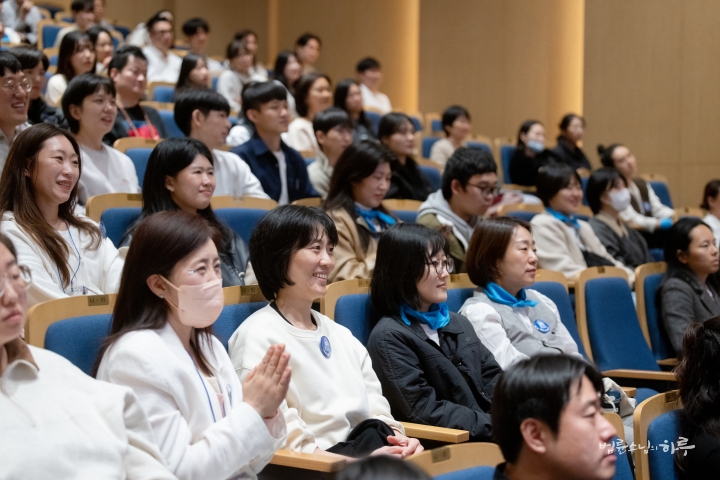
Without Money, Without Experts… We Did It
Whenever we try to do something, we say, ‘We can’t do it because we don’t have money,’ or ‘We can’t do it because we don’t have people.’ But we don’t necessarily need professional planning agencies or large budgets. This Youth Festival started with the mindset of ‘Let’s do as much as we can with our own strength.’ These days, in our capitalist society, money talk comes first everywhere, but I wanted to show that we can do things without money. While money is necessary, it’s not everything.
Not being able to date because of lack of money, not being able to do anything because of lack of money – these are just excuses. That’s why for this Youth Festival, we thought, ‘Let’s do it without money.’ You all did the planning yourselves, we maximized the use of existing spaces for venues, we recruited volunteers for operations, and Jungto Society members supported from behind the scenes where needed. All the performers also participated as volunteers. Now when Sunim proposes something, people already know they have to do it without pay. They respond with a smile, saying, ‘When have you ever paid us?’ (Laughter) Because I also don’t receive money when I give lectures, I can make such requests. Does everything in the world have to be done through buying and selling with money? We can share our talents and time and work together without compensation.
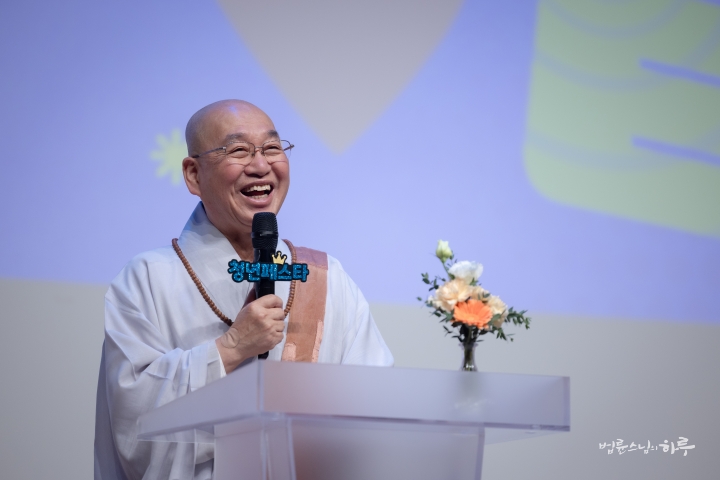
This might make us seem a bit inexperienced and clumsy. We’re not professionals, after all. But we’re not doing this to show off to others – we’re doing it to enjoy ourselves and gain experience. Based on this experience, we’ll be able to create better events with improved planning next time. For example, ‘Next time, let’s improve this aspect,’ ‘The games were fun, but let’s make them more diverse,’ ‘The speaker lineup was good, but let’s make it broader next time.’ We can fill in what was lacking and develop what went well. As we build experience in planning and operations within our community, someday people will say we’re ‘as good as professionals.’ Through experience, we can definitely approach professional level. I think this is not a ‘professional spirit’ but an ‘amateur spirit.’
Since this event was our first experiment, if we analyze it well at next week’s evaluation meeting, it will serve as good material for preparing the next event. When you volunteered and saw the young people’s faces at the venue, did it seem helpful or not?”
“It seemed helpful!”
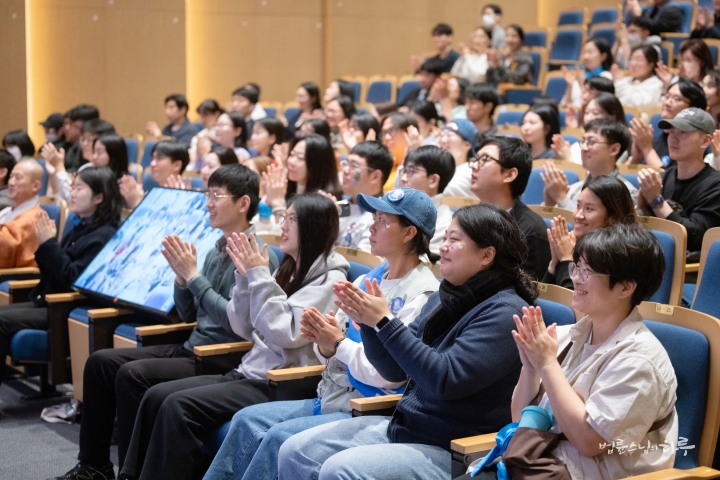
“The most significant feature of this event is that everything was accomplished through volunteer work. We showed that it’s possible without money and without professionals. I think the greatest gain from this event is that we attempted it by pouring in all our talents, time, connections, and resources. Each person’s small effort came together to create a great result. This is exactly what ‘many drops make an ocean’ means.
When I toured the venue, the skills of those hosting, managing proceedings, or singing were almost at a professional level. The food booth operations also ran smoothly. Thanks to everyone fulfilling their roles well, we finished without any incidents. I hope you’ll build on this experience and grow to the next level. Although it was a challenging process, take pride in creating this event by combining all your efforts. I’m proud of all of you too.”
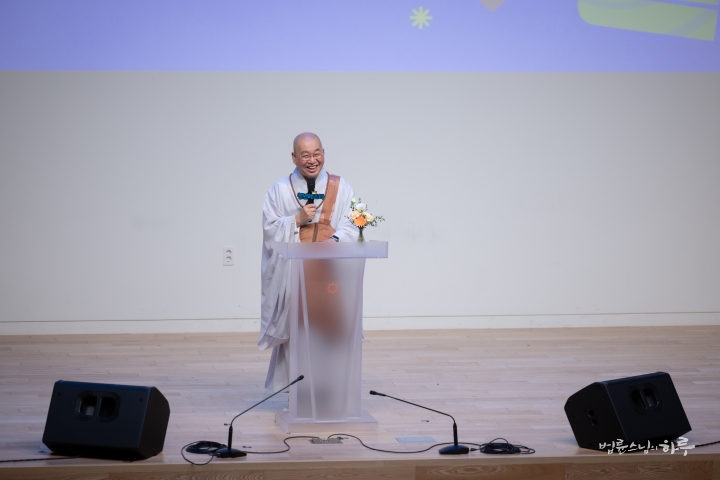
The youth supporters also expressed their gratitude to Sunim with loud applause for being with them during the three days of the Youth Festa.
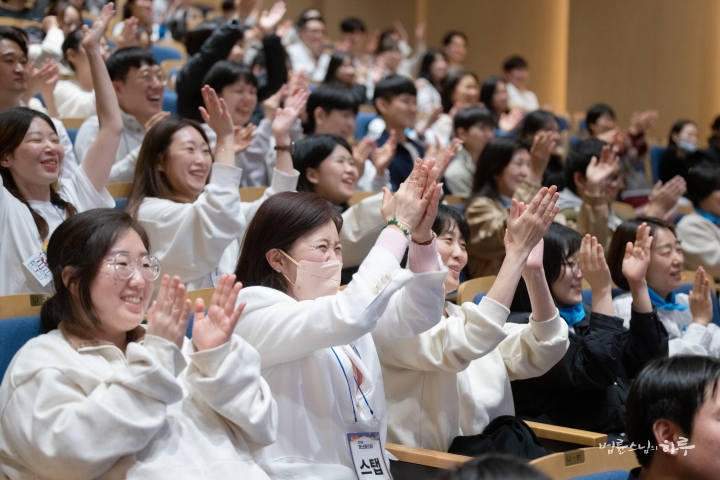
Next, there was time to introduce the youth supporters who worked hard and hear their reflections. First, representing the youth supporters, Park Soo-jung, the executive chairperson of the Youth Festa, shared her thoughts.
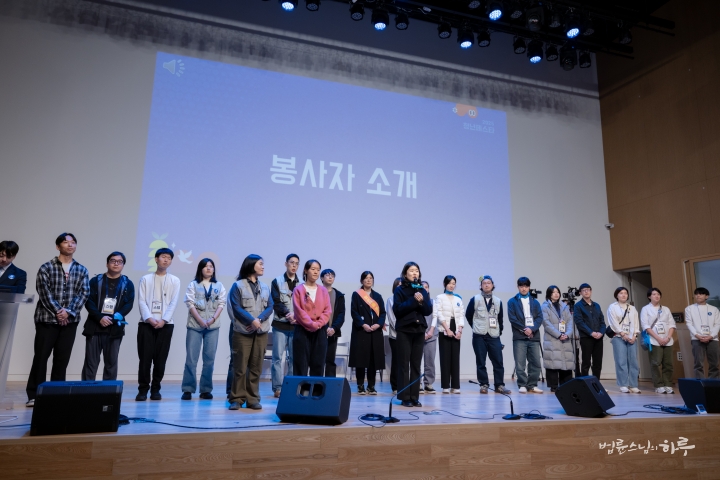
“There are about 700 supporters who did necessary work behind the scenes. Although there were many difficult moments, we were able to successfully complete this event because everyone gathered their time and hearts to do their best. Thank you so much.”
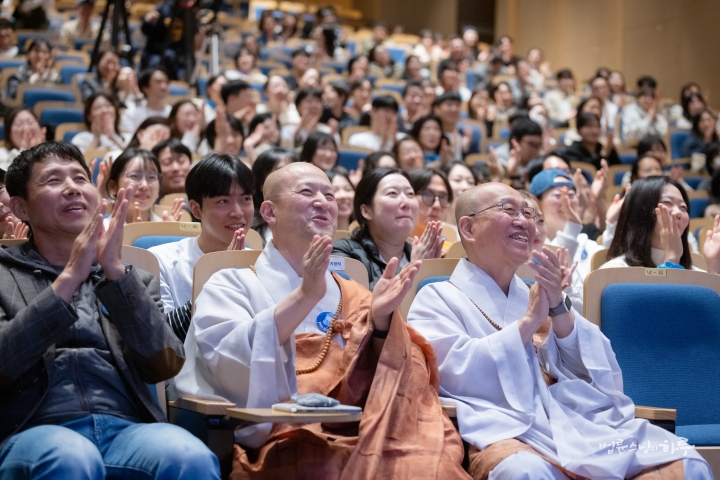
Following this, the heads of the Lecture Department, Seminar Department, Booth Department, Promotion Department, Information Department, and Support Department came forward in turn to introduce what their supporters had done and share their individual reflections.
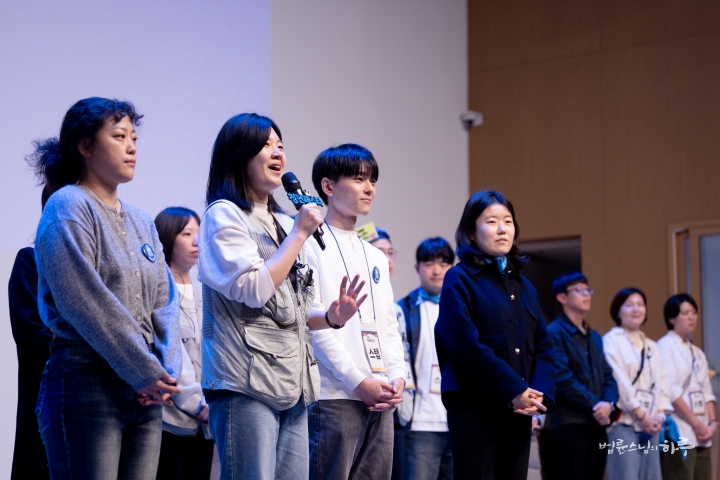
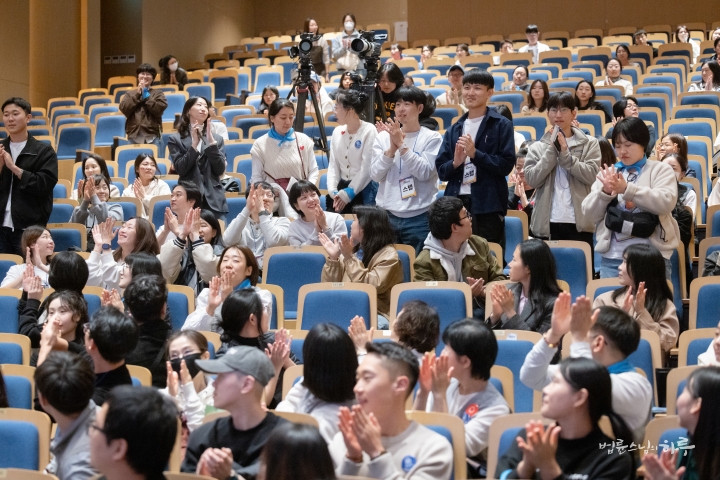
“While the Youth Festa is widely known externally as being lecture-focused, over the past three days, 14 seminars were held with 51 sessions conducted. About 70 volunteers worked hard just on seminar operations. It was a happy time to discuss with young people how we can beautifully cultivate our society.”
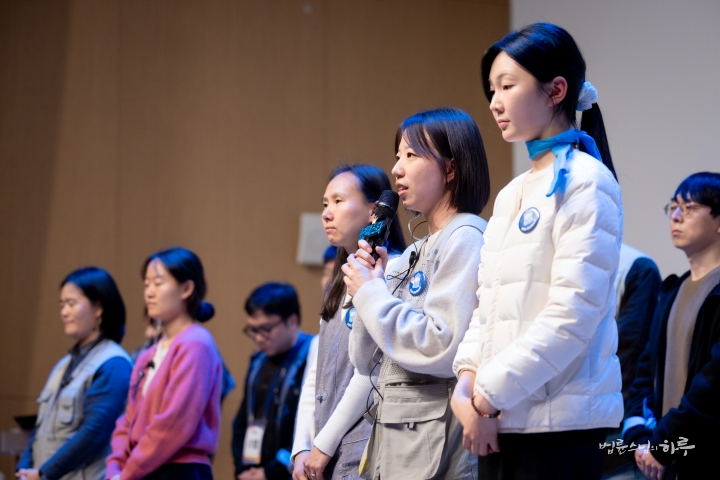
“The biggest thing I realized while organizing the Youth Festa was that I can’t do anything alone. Thank you to everyone who worked hard.”
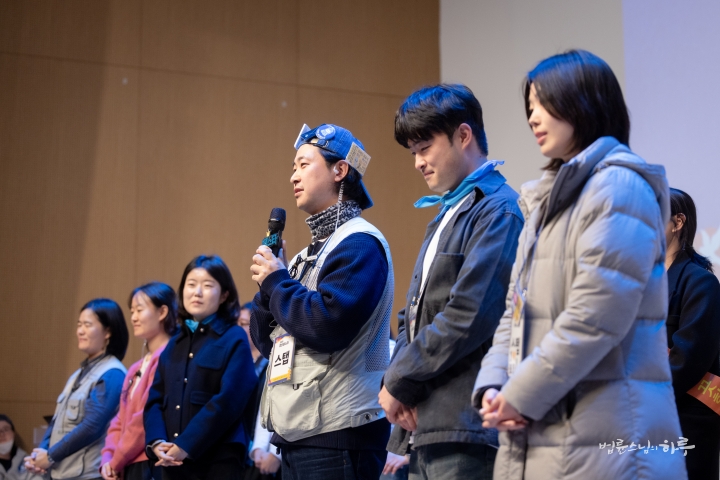
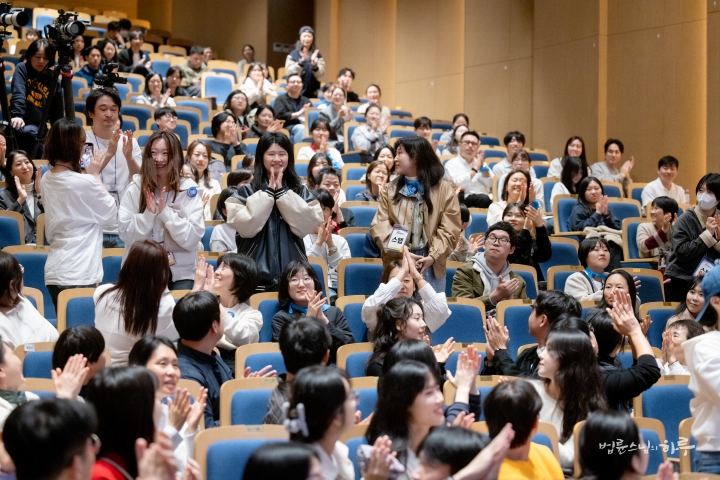
“We promoted hard. The Youth Festa Instagram views exceeded 1 million, and Facebook views exceeded 2 million. Our slogan when working was ‘We do it to our heart’s content.’ I think we truly did it to our heart’s content, just like our slogan.”
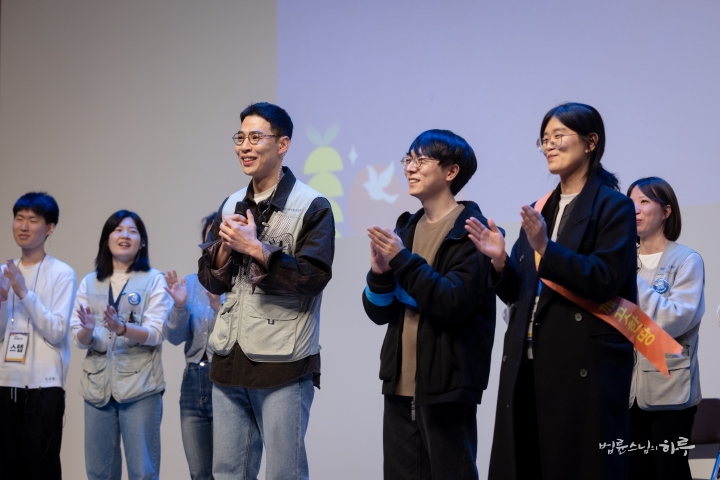
“Website development usually takes about a year, but our volunteers worked together to create it in just one month. We successfully handled pre-registration without any issues, managed seat assignments, and completed text message notifications. Some people even shed tears from working so hard. I’d like to take this opportunity to express my sincere gratitude.”
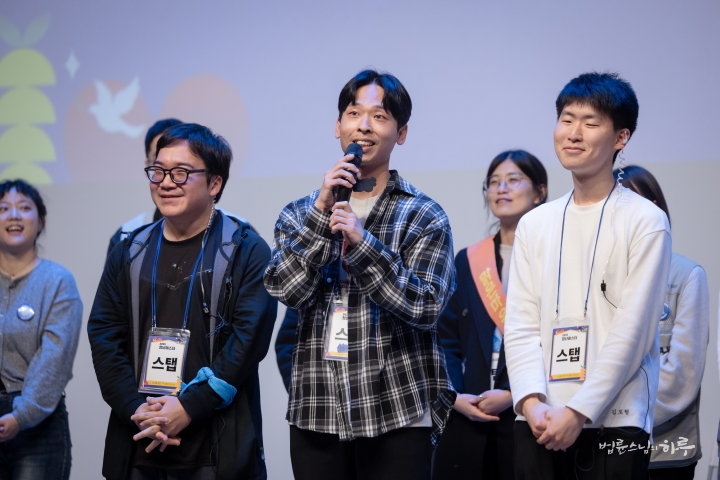
“It feels so good now that it’s over. The support team, which everyone says worked behind the scenes, really did work in invisible places. We did our best to rent and manage over 200 items. Everyone worked so hard.”
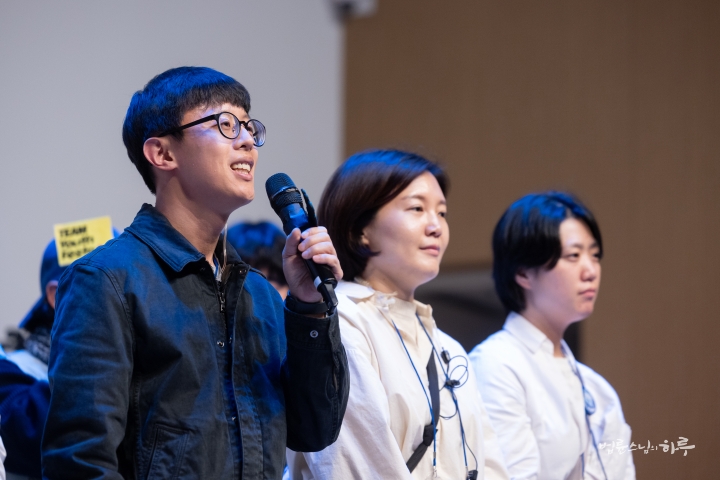
“I think our youth movement has just begun. Since we are the protagonists who created this touching moment, I hope we can continue to create the Youth Festa with even more people in the future.”
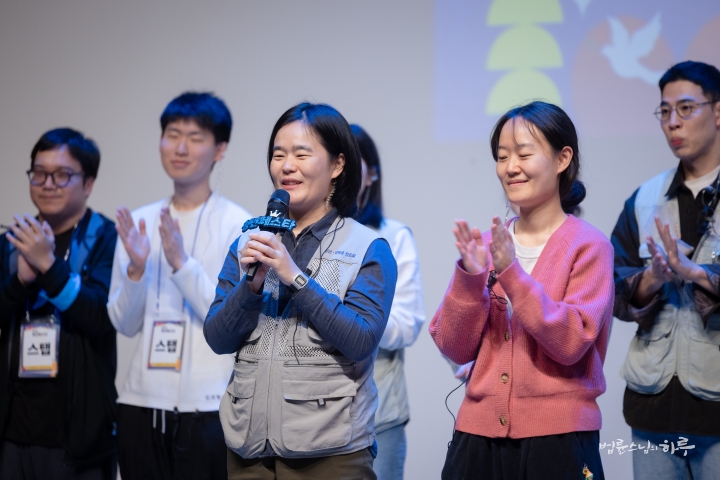
After hearing reflections from each country, they watched a video featuring the supporters together.
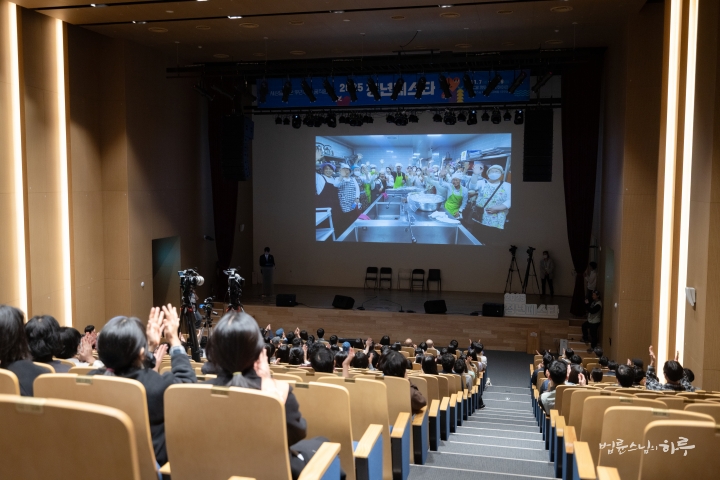
The supporters gave each other encouraging applause. Then, as the grand finale of the Youth Festa, the supporters performed to the soundtrack of “Youth Comic.”
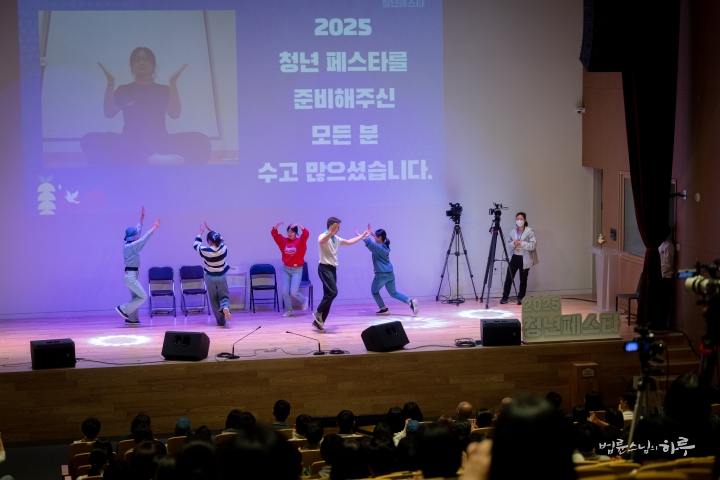
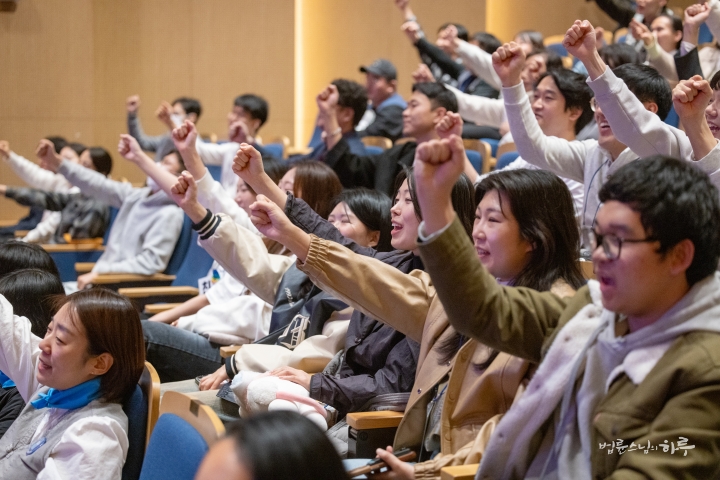
Everyone sang together, danced together, and enjoyed the final moments of the festival.
“This concludes the 2025 Youth Festa.”
After the emcee announced the closing, everyone took a commemorative photo together.
“Our movement toward the world!”
They concluded the Youth Festa by shouting the slogan in loud voices.
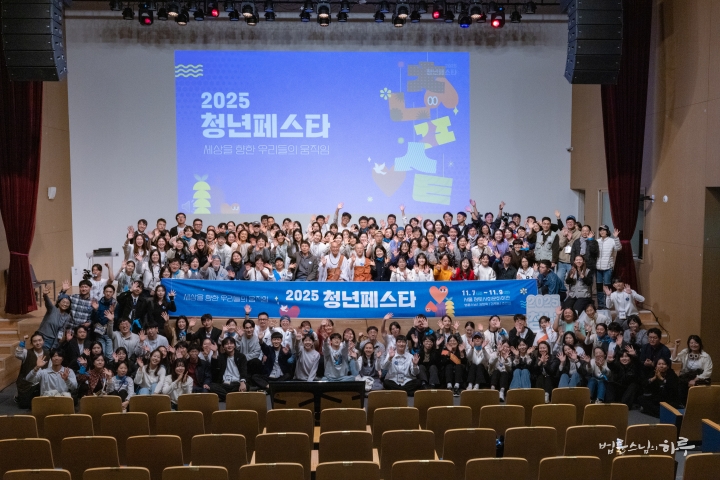
After expressing his gratitude to the youth supporters, Sunim left the Jungto Social and Cultural Center. At the entrance, volunteers were working on dismantling the setup.
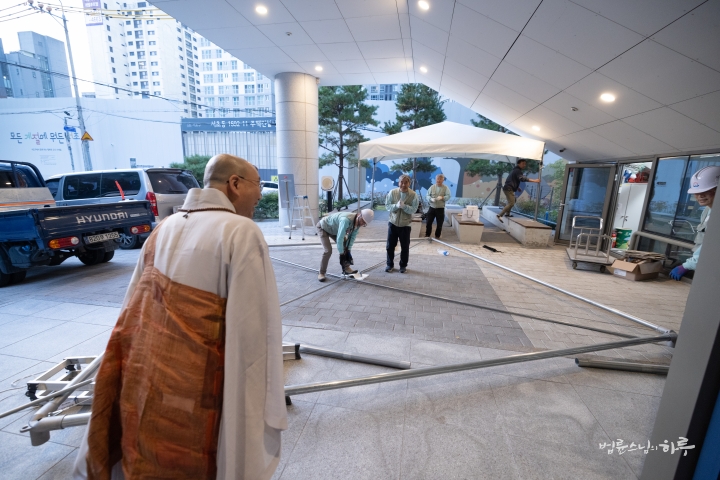
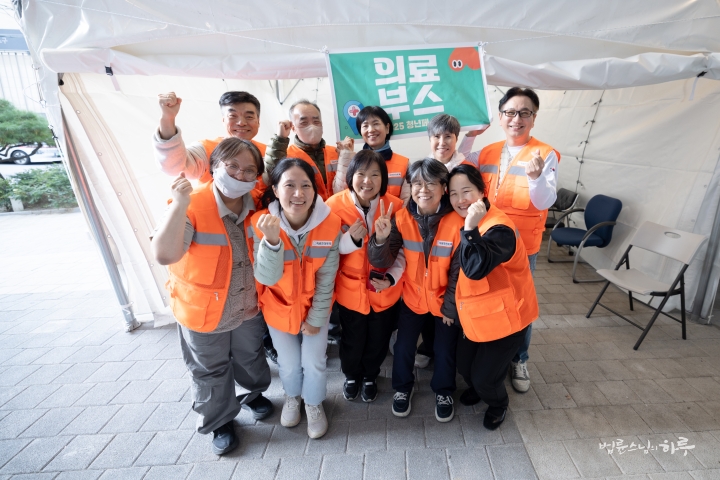
Despite the chilly weather, the Medical Professionals’ Jungto Society set up a medical booth in the first-floor courtyard, preparing for any potential situations and ensuring the safety of participants.
“Thank you for your hard work. Thank you.”
After personally thanking each volunteer who was cleaning up, Sunim got into the car.
At 5 PM, Sunim departed from the Seoul Jungto Social and Cultural Center and headed to Dubuk Jungto Retreat Center. The sun set during the car ride.
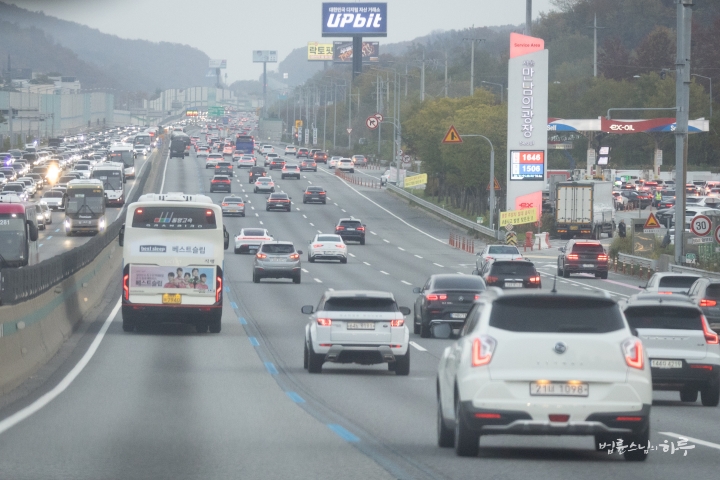
After driving on the highway for four hours, Sunim arrived at Dubuk Jungto Retreat Center at 9 PM and concluded the day’s activities.
Tomorrow morning, Sunim will broadcast the Leading Members’ Dharma Assembly live. In the afternoon, he will have conversations with guests visiting Dubuk Jungto Retreat Center and take a walk to Namsan Mountain in Gyeongju.





